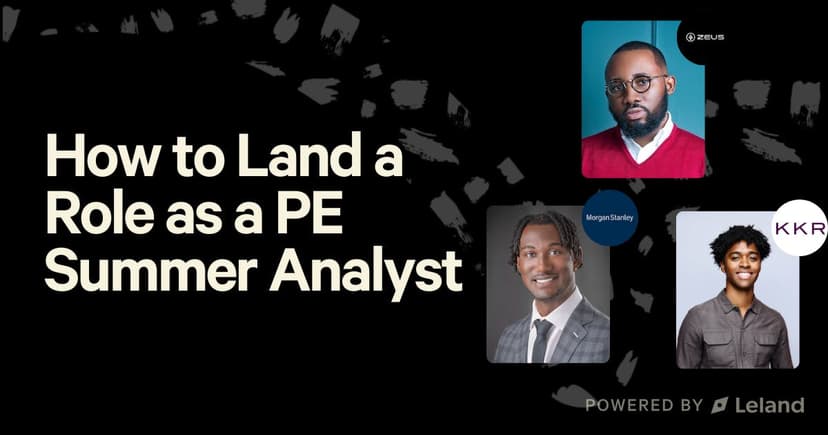PE vs. IB: What’s the Difference and Which Is Right for You?
Compare private equity vs investment banking across salary, lifestyle, skillsets, and exits to find which high-finance path fits your goals best.
Posted July 25, 2025

Join a free event
Learn from top coaches and industry experts in live, interactive sessions you can join for free.
Table of Contents
If you're torn between private equity and investment banking, you're not alone—and the stakes are high. Both offer prestige, pay, and fast-paced learning, but the day-to-day work, lifestyle, and long-term trajectory couldn’t be more different. This isn’t just a career decision, but also a decision about how you want to spend your time, energy, and future.
In this guide, we’ll break down the real differences, from comp and culture to exit ops and skillsets, so you can figure out which path fits you.
What Is Investment Banking?
Investment banking is the business of helping companies raise capital, execute complex financial transactions, and advise on mergers, acquisitions, and IPOs. Investment bankers work for top firms that operate within the capital markets, often at large, multinational institutions known as bulge bracket investment banks (like Goldman Sachs or Morgan Stanley).
Typical services of investment bankers include:
- Underwriting and launching an initial public offering
- Advising on mergers, acquisitions, and divestitures
- Facilitating capital raising through debt and equity
- Supporting publicly traded companies with strategic transactions
Junior roles like investment banking analysts are often entry-level but incredibly demanding—expect long hours, intense modeling work, and steep learning curves.
Read: Investment Banking: What it Is & How it Works
What Is Private Equity?
Private equity (PE) is focused on investing in and growing private companies. Private equity firms use a combination of their own capital and capital raised from pension funds, high net worth individuals, private equity investors, and institutional investors to buy, improve, and eventually sell businesses at a profit.
Private equity firms tend to:
- Specialize in certain industries or deal sizes
- Rely heavily on financial modeling and operational improvement
- Target portfolio companies that can exit via sale or initial public offering
Unlike investment bankers, private equity professionals often get deeply involved in the business itself—refining operations, optimizing revenue, and improving governance.
Read: What is Private Equity and How Does It Work?
Private Equity vs Investment Banking: Key Differences
| Criteria | Investment Banking (IB) | Private Equity (PE) |
|---|---|---|
| Core Function | Advises clients on capital raising, M&A, and strategic financial transactions | Sources, acquires, operates, and eventually exits portfolio companies for profit |
| Business Model | Fee-based: earns income via advisory fees, underwriting spreads, and transaction commissions | Return-based: generates profits by increasing the value of owned businesses and executing exit strategies |
| Company Focus | Works with publicly traded companies, private businesses, and governments | Targets private companies, sometimes carved out from larger corporations or family-owned businesses |
| Ownership Role | No equity stake; operates as a third-party advisor | Takes controlling or significant ownership stakes in portfolio companies |
| Deal Involvement | Manages deal structuring, diligence, and valuation—but steps away after the deal closes | Involved end-to-end: pre-deal sourcing, post-deal operations, board oversight, and value creation |
| Typical Clients | CEOs, CFOs, Boards of public companies, founders, and institutional issuers | Limited Partners (LPs), company founders, management teams of acquired companies |
| Work Hours | 70–100 hours/week; unpredictable and reactive to client needs | 60–80 hours/week; slightly more predictable but driven by deal cycle and portfolio demands |
| Key Skillsets | Fast-paced execution, financial modeling, valuation, market knowledge, and client-facing polish | Strategic thinking, operational insight, deep diligence, and investment thesis development |
| Compensation Structure | High salary + discretionary annual bonus; varies by deal flow and firm performance | Base + bonus + carry (a percentage of profits on successful exits, often paid over multiple years) |
| Team Structure | Hierarchical: analyst → associate → VP → director → MD | Leaner deal teams; flat during diligence but hierarchy in promotion: associate → VP → principal → partner |
| Performance Metrics | Number of live deals, pitch quality, client satisfaction | IRR/MOIC performance, successful exits, value creation in portfolio companies |
| Exit Opportunities | Private equity firms, hedge funds, corporate development, startups, venture capital | Growth equity, venture capital, hedge funds, operational roles at portfolio companies, and family offices |
| Long-Term Path | Path to MD involves rainmaking and client origination | Path to partner requires successful investments and strong LP relationships |
| Cultural Traits | Client service–oriented, high-pressure, polished, and reactive | Ownership mindset, operational rigor, focused, and detail-oriented |
Work Responsibilities
Understanding the daily responsibilities in investment banking vs private equity can help you figure out not just what looks good on paper, but what you’ll actually be doing at 11:00 p.m. on a Tuesday.
Investment Banking (Analyst/Associate Level)
Junior investment bankers are deal execution machines. Your job is to support senior bankers in pitching and executing transactions like IPOs, M&As, and capital raises. Expect long hours, tight turnarounds, and lots of iteration.
Core responsibilities include:
- Creating pitch materials (“decks”) for client meetings and new business opportunities
- Building and auditing complex financial models for valuation (DCF, comps, LBO, etc.)
- Conducting due diligence, including gathering public filings, market data, and management materials
- Coordinating across legal, accounting, and internal teams to move deals forward
- Managing client requests and tracking deal timelines—often across multiple live deals and pitches
Private Equity (Associate Level)
PE associates operate with more ownership and judgment. You’re expected to think like an investor, vet deals critically, and contribute to portfolio growth, not just build models.
Typical responsibilities include:
- Sourcing and evaluating potential investments, including screening CIMs, reviewing financials, and initial outreach to targets
- Leading diligence efforts across business, financial, and legal workstreams (with support from external advisors)
- Owning the financial model—building the LBO, testing sensitivities, and supporting the investment thesis
- Working closely with management teams of portfolio companies post-acquisition to track KPIs, optimize performance, and prepare for exit
- Preparing internal memos and IC (investment committee) materials, defending why this deal fits the fund’s strategy and return targets
Typical Day-to-Day
Investment Banking Analyst
A typical day in investment banking is reactive, unpredictable, and fast-paced. You’re often juggling multiple live deals and client demands, so the plan for your day can change by 10 AM.
Example Day:
- 8:30 AM – Check overnight emails and last-minute model comments
- 9:30 AM – Work on a comps deck for a client pitch later that week
- 12:00 PM – Grab lunch (if there's time), continue building materials
- 3:00 PM – Join diligence call for a live M&A deal
- 6:00 PM – Senior banker sends deck edits due tonight—cancel dinner plans
- 9:00 PM–2:00 AM – Revisions, formatting, model updates, more comments...
Deadlines are client-driven, and priorities shift fast. Expect frequent “fire drills,” late nights, and a steep learning curve. You’re building resilience and execution skills under pressure.
Read: A Day in the Life of an Investment Banker: Role, Hours, & Responsibilities
Private Equity Associate
In private equity firms, the workflow is more structured, but the decisions carry weight. You’re evaluating companies not just for what they are, but what they could become with your firm’s capital and guidance.
Example Day:
- 8:00 AM – Review pipeline updates and respond to emails
- 9:30 AM – Meeting with a potential portfolio company’s management team
- 11:00 AM – Deep dive into revenue drivers and financials of a target company
- 2:00 PM – Internal diligence sync with the deal team and legal advisors
- 4:00 PM – Update investment committee memo and scenario analysis
- 7:00 PM – Leave office or finish modeling from home (unless a deal is hot)
You’ll spend time thinking critically, modeling deals from multiple angles, and working directly with operators post-close. While the pace isn’t as chaotic, the stakes are higher—your judgment drives multimillion-dollar outcomes.
Read: Analyst vs. Associate: Role, Responsibilities, & Salary
Lifestyle and Hours
Investment Banking
- Typical hours: 80–100+/week
- Lifestyle: Client-first, unpredictable, often all-consuming
- Culture: Hustle-heavy, hierarchical, performance-driven
IB hours are legendary for a reason. Late nights, weekend work, and “please turn this by morning” requests are common. The upside? Fast skill development, top-tier exit opportunities, and compensation that reflects the grind.
Private Equity
- Typical hours: 60–80/week
- Lifestyle: Intense, but more control over schedule and workflow
- Culture: High-performance, low-fluff, analytical, and judgment-driven
PE hours are still long, but usually more predictable. Private equity firms typically operate with smaller teams, so expectations are high, especially near deal closing. That said, fewer client fire drills mean slightly more breathing room.
Salary and Compensation
| Role | Average Base Salary | Annual Bonus | Long-Term Incentive (LTI) | Notes |
|---|---|---|---|---|
| IB Analyst (1st Year) | $110K–$130K | $60K–$120K (performance + group bonus) | None | Bonus tied to deal volume and team performance. Signing bonuses are common. |
| IB Associate (Post-MBA or promote) | $150K–$180K | $90K–$200K+ | Minimal (if any) | Some top firms offer deferred bonuses or equity incentives at senior levels. |
| PE Associate (Pre-MBA) | $150K–$175K | $100K–$200K (base + firm performance) | Carry eligibility begins at VP/Principal | Often includes signing + stub bonuses. May receive small bonuses at junior levels. |
| PE VP (Post-MBA level) | $200K–$250K | $150K–$300K+ | Entry-level carry participation | Vesting typically begins; % varies by firm and deal economics. |
| PE Principal/Partner | $300K–$500K+ | $300K–$800K+ | Significant carry (can exceed base/bonus by multiples) | Top partners at megafunds can earn $5M–$20M+ annually when carry vests. |
Skillsets Required
While investment banking and private equity share a technical foundation—especially in financial modeling—the skillsets diverge in ways that shape how you’re evaluated, trained, and promoted. Here's what each path really values:
Investment Banking: Precision, Endurance, Execution
Top-performing bankers are execution machines—fast, detail-obsessed, and client-ready. Your job is to support transactions under extreme time pressure, and accuracy is non-negotiable.
Key skills:
- Speed and stamina under pressure: You’ll turn multiple drafts of client materials under tight deadlines, sometimes overnight
- Excel and PowerPoint mastery: Fast formatting, model building, and deck creation are your daily toolkit
- Flawless attention to detail: A misplaced comma or formula error can lose client trust or tank credibility with a managing director
- Client polish and communication: You’ll sit in on calls and may even run with junior client asks—clarity, tone, and confidence matter
- Understanding of capital markets and financial instruments: Especially in ECM/DCM roles, you'll need fluency in bond and equity offerings
Work with a Leland coach who’s trained analysts at Goldman, JPMorgan, and Evercore—get real deal reps, mock interviews, and expert feedback on your modeling. Explore Investment Banking Coaches here.
Private Equity: Judgment, Strategy, Ownership Mindset
Private equity firms hire professionals who can think like investors—not just crunch numbers, but also evaluate people, markets, and risk.
Key skills:
- Strategic thinking and pattern recognition: Can you assess not just what a company is, but what it could become under your firm’s ownership?
- Deep diligence capabilities: You’ll lead workstreams across legal, financial, and operational areas, often synthesizing incomplete data
- Business judgment and market sense: PE professionals are expected to speak the language of operators, CEOs, and industry experts
- Comfort with ambiguity and long-term bets: Unlike banking, where the deal ends at the close, PE is about value creation over the years
- Private markets fluency: Understanding how private equity firms, portfolio companies, and limited partners interact is key
Book a session with a former PE associate or partner to walk through real investment cases, learn how to build a thesis, and prepare for high-pressure case interviews. Browse Private Equity Coaches here.
Career Progression
Investment Banking: Structured, Hierarchical, and Predictable
Banking is known for its defined promotion track, especially at large bulge-bracket investment banks. If you perform well and stick around, you’ll likely move up on a fairly standard timeline.
Typical path:
- Analyst (Years 1–2): Post-undergrad role focused on execution—modeling, decks, and support work
- Associate (Years 3–5): Post-MBA or promoted analyst. Begins managing analysts and owning parts of the client relationship
- VP (Years 6–8): Oversees deal execution, runs client meetings, owns deliverables
- Director/ED (Years 9–10+): Split role—some execution, some origination. Prepping to become a rainmaker
- Managing Director (10+ years): Full focus on sourcing deals, managing client relationships, and bringing in revenue
Promotion drivers: Consistency, technical excellence, internal reputation, and eventually, deal origination. You’re climbing a well-defined ladder, but competition tightens near the top.
Private Equity: Performance-Based, Less Linear, Higher Risk/Reward
In PE, advancement is more of a “prove-it” model. Titles and timelines vary by firm, and promotion is less about tenure and more about deal success, judgment, and firm fit.
Typical path:
- Associate (Pre-MBA, 2–3 years): Project-based contract. Many leave for an MBA, though top performers are sometimes promoted directly
- Senior Associate / VP (Post-MBA or promote): Begins leading parts of deals, managing diligence workstreams, and preparing IC materials
- Principal: Full deal ownership, LP communication, early-stage fundraising involvement
- Partner / MD: Drives strategy, raises funds, owns LP relationships, and mentors the team. Often carries a significant share
Promotion drivers: Investment track record, IC performance, sourcing ability, and internal fit. It’s less structured than banking and more Darwinian—up or out is common.
Private Equity vs Investment Banking: Which Is Harder to Get Into?
The short answer? Private equity is harder, but only if you’re trying to skip steps.
Investment banking is the front door. It’s the most common launchpad into elite finance roles, and the recruiting process is intense but structured. Banks run rigid pipelines, especially at top schools, with clear timelines, resume screens, and superdays. If you prep early and execute, you can get in.
Private equity, on the other hand, is much more exclusive—and much less forgiving.
- Most PE associate roles are not entry-level. They require 2+ years of investment banking (or top-tier consulting) experience.
- Firms expect candidates to show up “deal-ready”—fluent in LBOs, cap tables, and due diligence, not just smart and eager.
- Even at top banks, only a subset of analysts land on-cycle PE offers. It’s competitive within an already elite pool.
Breaking directly into PE from undergrad? Extremely rare. Some lower-middle-market firms or venture capital shops hire juniors, but megafunds and brand-name PE firms almost never do.
Meanwhile, IB recruiting has become more compressed and technical. Target school students are prepping sophomore year, sometimes earlier. Non-targets face a steep networking and resume-building climb.
Exit Strategies and Opportunities for IB and PE Professionals
Investment banking opens doors to:
- Private equity firms
- Hedge funds
- Corporate strategy and asset management
- Startups and venture capital
Private equity offers exits to:
- Growth equity or venture capital firms
- Family offices or real estate investor roles
- C-suite at portfolio companies
Each gives you strong options, but PE tends to lock you in deeper as a long-term investment business.
How to Choose Between PE and IB
Ask yourself:
- Do you want to advise companies or actually run them?
- Do you prefer capital raising or capital deployment?
- Can you handle IB’s grind, or do you want operational depth?
- Are you optimizing for comp now, or long-term carry later?
Use this quick decision flow:
Prefer structure, variety, speed? → Investment BankingWant ownership, depth, operational control? → Private Equity
Can You Move From IB to PE (or Vice Versa)?
Absolutely. Most PE roles expect prior IB experience. The path from IB to PE is well-trodden, especially for analysts with deal reps and strong modeling skills.
Going the other way—from private equity to investment banking—is rare but possible, especially if you shift toward advisory services or capital markets roles.
Final Thoughts
There’s no single “better” path—private equity vs investment banking comes down to what you value: speed vs depth, advising vs owning, base + bonus vs carry upside.
And while both are tough to break into, you don’t have to navigate the choice or the recruiting process alone.
Choose the Right Career for You with Help from an Expert
Want tailored guidance on landing your first IB or PE role? Book a free intro call with a top investment banking or private equity coach to sharpen your resume, prep for interviews, or build a step-by-step game plan.
Read these next:
- Wealth Management vs. Investment Banking: Key Differences and Career Prospects
- Corporate Finance vs. Investment Banking: Overview, Pros/Cons, Salary, & How to Decide
- An Expert’s Guide to Resumes: Five Tips to Make You Stand Out
- The Different Types of Buy-Side Firms–and How to Choose One
- 10 Finance Internships for Freshmen in College
FAQs
Can you start in private equity straight from undergrad?
- It’s exceptionally rare. Most PE firms expect candidates to come in with 2+ years of experience in investment banking, consulting, or restructuring. Only small, mid-market, or niche firms might hire undergrad analysts—and even then, the role often involves sourcing, not true deal execution.
How does an MBA affect career trajectories in IB and PE?
- In IB, an MBA often leads to a return offer at an associate level post-MBA, with sponsorship common.
- In PE, many entry roles (especially pre-MBA associates) are designed as stepping stones toward an MBA. Advancing beyond an associate often requires elite MBA credentials.
Which role offers more intellectual lift—IB or PE?
- While both demand analytical skills, PE generally offers deeper strategic work. Analysts may spend hundreds of hours running comps or formatting decks, but PE roles focus on shaping an investment thesis, operational input, and long-term value creation — less templated, more ownership-driven.
Are IB or PE hours better compensated in terms of work-life tradeoff?
- Although PE typically offers fewer hours (60–80 vs. 80–100 in IB), the expectations near deal-closing often equalize. PE at megafunds can be as demanding as IB, but overall, PE offers incrementally more balance outside peak deal periods.
How sensitive are these roles to economic cycles or regulation??
- IB fees fluctuate with IPO and M&A volumes—often dropping during slow economic periods
- PE activity slows during downturns, too, but funds with sufficient dry powder can still target distressed or opportunistic investments, giving slightly more flexibility
Browse hundreds of expert coaches
Leland coaches have helped thousands of people achieve their goals. A dedicated mentor can make all the difference.





















